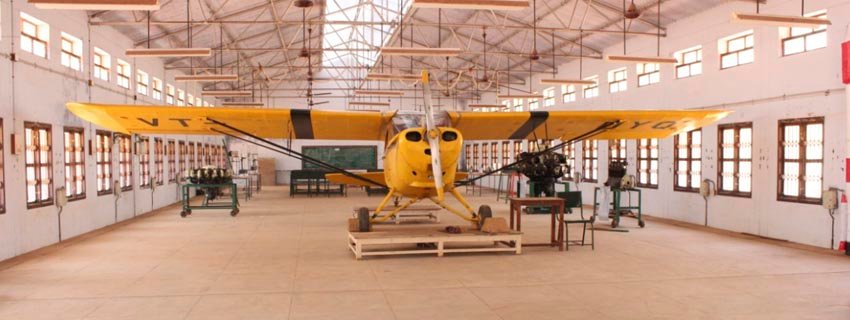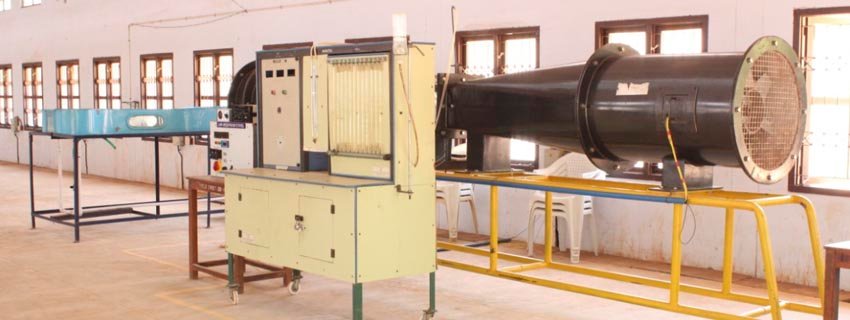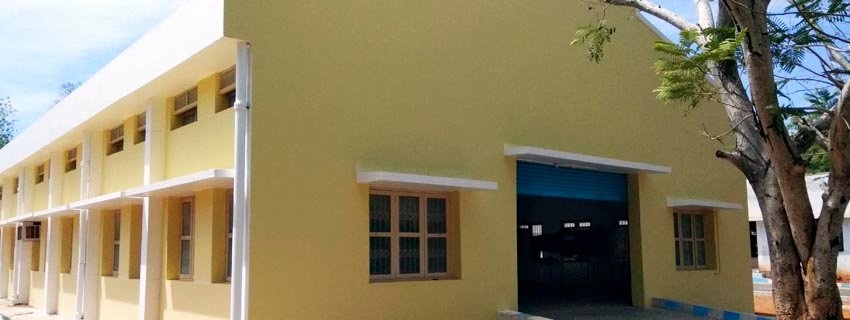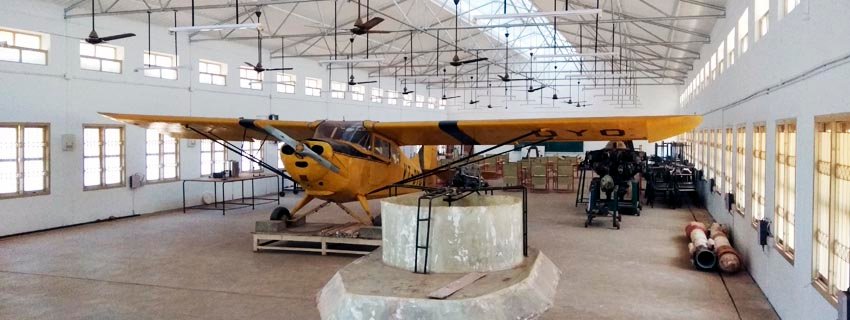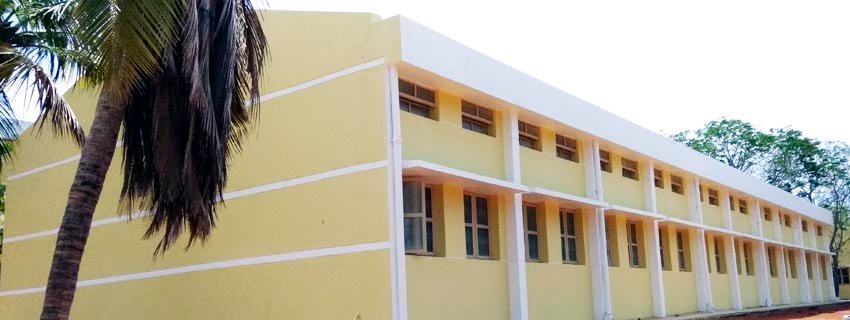Department of Aeronautical Engineering
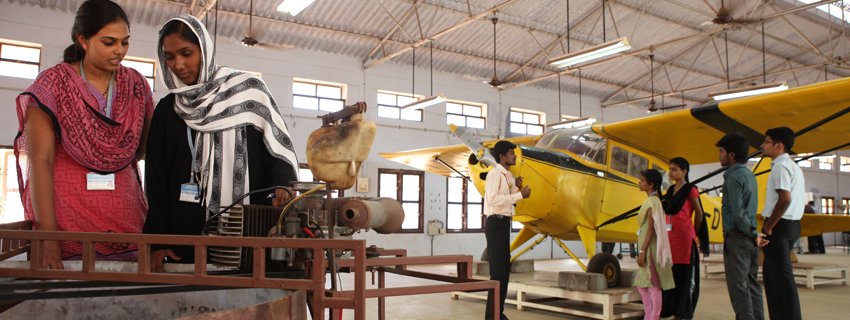
Overview
Aeronautical Engineering Department was started in 1998 in this institution and was the first of its kind among the self- financing Engineering Colleges in Tamil Nadu. The department was started with a strong mission to promote Aeronautical and Aero space related activities especially in the field of Aircraft design, Production and Maintenance Engineering. The department is at present encompassing Aerodynamics Lab, Aircraft structures Lab, Aircraft Structural Repair practices Lab, Propulsion Lab, Aero Engine Maintenance and Repair Lab, Design and Drafting Lab, Aircraft Design Project Lab, Aircraft systems Lab, Avionics Lab and CAD / CAM Lab etc., In addition to the related books available in the college main library, the department library also has adequate number of books on Aeronautical Engineering for reference to enlighten the staff and studying.
The department is also supported by other department laboratories such as Fluid Mechanics Production Process, Strength of Material and Thermodynamic Lab, Electrical Sciences and Computers etc., Real Aircraft systems, Electrical Systems, Landing gear and A/C Instrumentation Systems etc., are also available to provide hands on training to the students. The students learning process is augmented by arranged lectures by experts in the field of Aeronautical Engineering through the ‘students forum’ in the Department known as “Airflare Association”. Students are also encouraged to build aircraft models through “Aeromodelling Club” in the Department. Memorandum of Understanding is signed with software companies to train the students on software packages such as Ansys, Pro-E and CATIA.
Regular Industrial Visits / Seminars / In – Plant Training / Project work are arranged to HAL, NAL, DRDL, NAVAL, Air station, DRDO, TANEJA Aircraft & Aerospace Limited, CABS, Aeronautical establishment of Air force and Navy, Indian Air lines, JET Airways, DECCAN Airways etc. The Students are well placed in the leading Aeronautical Organizations. The department organizes National Level Conference every year invitees Research Scholars and budding aero engineers from other institutions and honour the best paper presenters. The department is headed by a well known senior professor and is maintaining its best position with respect to rank holders including Gold Medalists in Anna University, Chennai.
Programme
Duration:
4 years (Regular) / 3 years (Lateral Entry)
No. of Semesters:
8 (Regular) / 6 (Lateral Entry)
Intake / No. of Seats:
Total - 30 (Government - 15, Management - 15)
Eligibility:
10+2 system of Education. Must have secured a pass in Physics, Chemistry and Mathematics in the qualifying examination.
For more information Click here
VISION
The Department of Aeronautical Engineering envisions becoming a center of excellence, equipping the students with value and skill based education, pursing globally relevant research and producing professionals committed to nation building.
MISSION
i. To impart high quality technical education and unique interdisciplinary experiences
ii. To develop students into engineering leaders with analytical, computational and design capabilities to provide sustainable solutions.
iii. To expose the students to the current trends and opportunities in the global Aerospace industry.
iv. To inculcate professional responsibility based on an innate ethical value system.
Programme Educational Objectives (PEOs)
| PEO1. | To employ comprehensive knowledge in Aeronautical Engineering and analytical skills to work towards solving complex problems to excel in the professional career. |
| PEO2. | To design, analyze and produce cutting edge engineering solutions by employing modern techniques and adhering to moral values for sustainable development. |
| PEO3. | To assume global careers and leadership responsibilities through consistent learning with idealistic managerial practices. |
Program Specific Outcomes (PSOs)
| PSO1. | To gather data using modern tools and apply design techniques to develop solutions for challenges in the domain of Aerodynamics, Propulsion, Aircraft Structures and Aircraft Maintenance with professional ethics. |
| PSO2. | To function as engineering solution providers or entrepreneurs, who are able to manage, innovate, communicate, train and lead a team for continuous improvement. |
| PSO3. | Graduate will be able to work as a team member which will be a main requirement in industry or research organisation or in any business enterprise. This will pave the way for successful career for the graduate and also play a role for the success of the organisation in which the graduate is employed |
Programme Outcomes (PO)
| PO1. | Engineering knowledge: | Apply the knowledge of mathematics, science, engineering fundamentals, and an engineering specialization to the solution of complex engineering problems. |
| PO2. | Problem analysis: | Identify, formulate, review research literature, and analyze complex engineering problems reaching substantiated conclusions using first principles of mathematics, natural sciences, and engineering sciences. |
| PO3. | Design/development of solutions: | Design solutions for complex engineering problems and design system components or processes that meet the specified needs with appropriate consideration for the public health and safety, and the cultural, societal, and environmental considerations. |
| PO4. | Conduct investigation of complex problem: | Use research-based knowledge and research methods including design of experiments, analysis and interpretation of data, and synthesis of the information to provide valid conclusions. |
| PO5. | Modern tool usage: | Create, select, and apply appropriate techniques, resources, and modern engineering and IT tools including prediction and modeling to complex engineering activities with an understanding of the limitations. |
| PO6. | The Engineer and Society: | Apply reasoning informed by the contextual knowledge to assess societal, health, safety, legal and cultural issues and the consequent responsibilities relevant to the professional engineering practice. |
| PO7. | Environment and sustainability: | Understand the impact of the professional engineering solutions in societal and environmental contexts, and demonstrate the knowledge of, and need for sustainable development. |
| PO8. | Ethics: | Apply ethical principles and commit to professional ethics and responsibilities and norms of the engineering practice. |
| PO9. | Individual and team work: | Function effectively as an individual, and as a member or leader in diverse teams, and in multidisciplinary settings. |
| PO10. | Communication: | Communicate effectively on complex engineering activities with the engineering community and with society at large, such as, being able to comprehend and write effective reports and design documentation, make effective presentations, and give and receive clear instructions. |
| PO11. | Project Management and Finance: | Demonstrate knowledge and understanding of the engineering and management principles and apply these to one’s own work, as a member and leader in a team, to manage projects and in multidisciplinary environments. |
| PO12. | Life-long learning: | Recognize the need for, and have the preparation and ability to engage in independent and life-long learning in the broadest context of technological change. |
Department Facilities
| Description | No of Rooms | Total Area (m2) |
|---|---|---|
| Class Rooms | UG - 3 | 66.75 |
| Faculty Rooms | Faculty - 2 | 66.75 |
| Department Library | 1 | 15 |
| Laboratories | 1 | 474.15 |
Aero Engine and Airframe Laboratory
i) Aircraft Piston Engineii) Camshaft Operation, Firing Order and Magneto, Valve Timing
iii) Lubrication and Cooling System
iv) Auxiliary Systems, Pumps and Carburetor
v) Aircraft Wood Gluing-Single & Double Scarf Joints
vi) Single/Double Riveted Lap Joint
vii) Single/Double Riveted Butt Joint
viii) Sheet Metal Forming
ix) Tube Bending and Flaring
Aircraft Structures Laboratory
i) Deflection of Beamsii) Maxwell’s Reciprocal Theorem
iii) Slender Eccentric Columns
iv) Unsymmetrical Bending of a Cantilever Beam
v) Combined Bending and Torsion of a Hollow Circular Tube
vi) Material Fringe Constant of a Photo Elastic Models
vii) Fabrication of a composite laminate
viii) Tension Field Beam
Propulsion Laboratory
i) Velocity Profiles of Free Jetsii) Velocity Profiles of Wall Jets
iii) Subsonic diffusers and ramjet ducts
iv) Piston Engine
Faculty
| Name | Qualification | Designation | Date of Joining | Nature of Association (Regular / Contract / Adjunct) |
Dr. C. JAYASEELAN |
M.E., Ph.D., | Professor & Head | 26/08/2024 | Regular |
Mr. M. MANIKANDAN |
M.E., | Assistant Professor | 10/07/2011 | Regular |
Mr. C. RAMARAJ |
M.E., | Assistant Professor | 07/09/2011 | Regular |
Mr. J. R. JONES ARUN RAJ |
M.E., | Assistant Professor | 17/12/2011 | Regular |
Mrs. M. RAJARAJESHWARI |
M.E., | Assistant Professor | 03/09/2014 | Regular |
Mr. A.M. NAGARAJESWARAN |
M.E., | Assistant Professor | 18/01/2023 | Regular |
Ms. S. RASIKA BANU |
M.E., | Assistant Professor | 29/09/2022 | Regular |
Mr. G. VIKRAM KUMAR |
M.E., | Assistant Professor | 12/06/2024 | Regular |
Mr. N. NAVEEN RAJA |
M.E., | Assistant Professor | 19/06/2024 | Regular |
Academics
Innovation in Teaching
| Subject Code | Subject Name | ITM Tool |
| Big Data Analytics | ||
| Computer Networks | ||
| Object Oriented Analysis and Design | ||
| Microprocessor and Microcontroller | ||
| Software Engineering | ||
| Computational Intelligence | ||
| Mobile Communication | ||
| Web Technology | ||
| Data Structures & Algorithms | ||
| Web Essentials | ||
| Networks and Security | ||
| Computer Graphics and Multimedia | ||
| Problem Solving and Python Programming | ||
| Object Oriented Programming |
infrastructures

